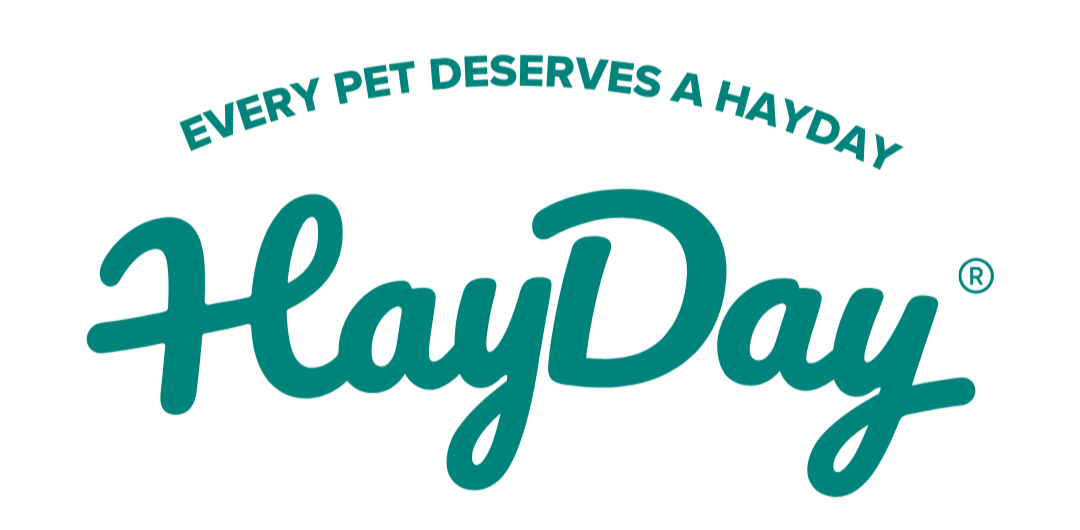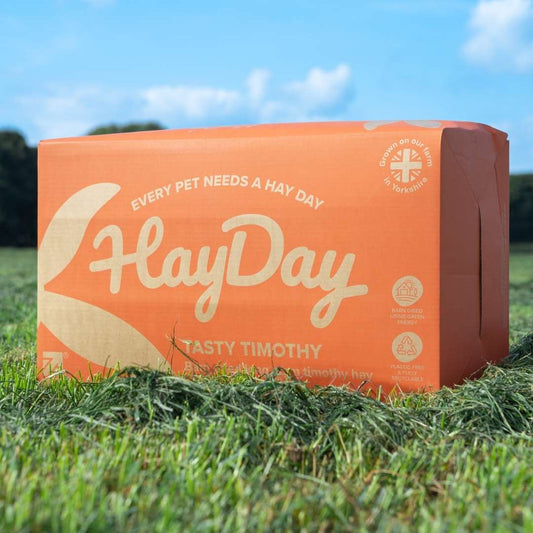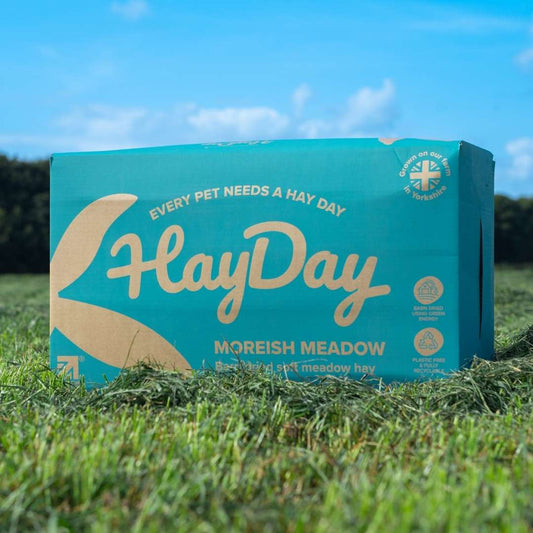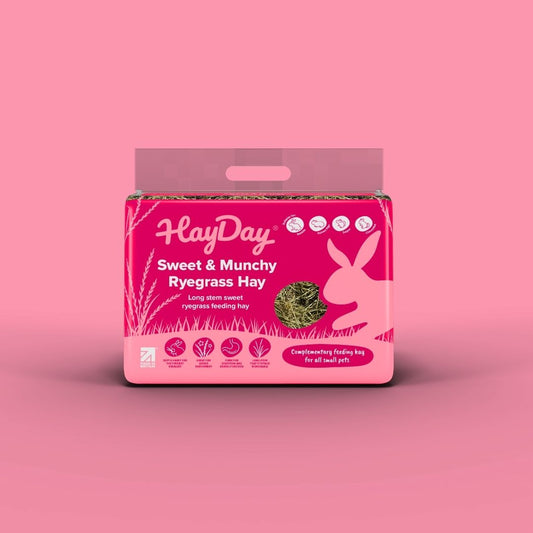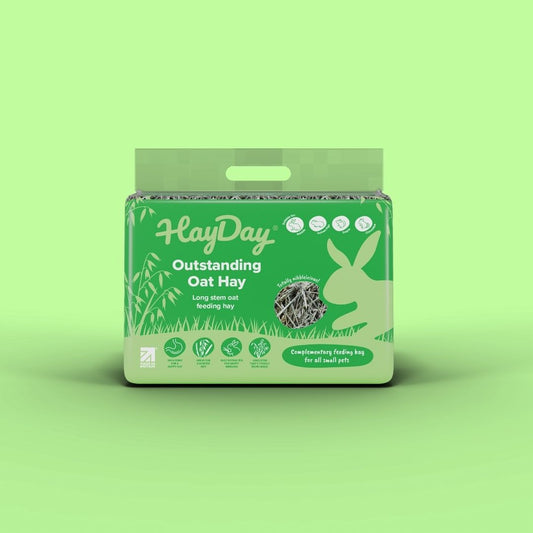What Degus Eat & Best Feeding Options
If you are a proud new owner of one of these furry friends or considering adding one to your family, then you are likely asking yourself, what do degus eat?
A degu’s diet is simple yet specific: high-quality hay, degu nuggets, selected leafy greens, and some low-sugar fruits and seeds are key to their wellbeing (Miller, 2022b; RSPA, 2024)
By focusing on these essentials, you can prevent health issues like diabetes and dental problems.
In this article, our experts at HayDay will outline the best diet for a healthy degu, helping you tailor your mealtimes to benefit their unique nutritional needs.
Click here > For premium quality, dust extracted and barn dried hay for Degus.
Our Guide to Degu Diet - Overview
-
A balanced diet for degus consists of high-quality hay (80-90%), degu nuggets and vegetable foods.
-
Degus require essential nutrients such as fibre, vitamins, and minerals, with a low sugar content to avoid diabetes and dental disease, and should have a diet similar to their natural one in the wild.
-
Providing different types of hay and fresh, clean water is essential, as well as avoiding foods high in sugars and carbohydrates, and certain vegetables and fruits that are high in sugar.
Understanding Your Degu's Nutritional Needs
As cute and cuddly as pet degus may be, their nutrition needs are rather complex. The overall health and wellbeing of degus heavily rely on a balanced diet.
Despite their seemingly insatiable appetite, degus should not be allowed to consume just any food. Their diet should replicate that of their wild counterparts, which encourages their selective feeding behaviour and satisfies their unique nutritional needs.
A proper degus diet helps in the avoidance of health issues such as diabetes, dental problems, and related diseases, necessitating a diet that aligns with their unique nutritional requirements (PDSA, 2024).
Wild Degus Eating Habits to Try and Replicate
Wild degus in the Andean slopes of Chile have a diverse diet primarily consisting of:
-
Grasses
-
Green vegetation
-
Bark
-
Seeds
-
Fruit
Source: Miller, 2022b; Yeates, 2018
With an emphasis on seeds, stems, and leaves, this plant-based diet supports their distinct nutritional needs and contributes to their overall health and wellbeing, including a healthy digestive system.
Moreover, these small rodents exhibit adaptive foraging behaviours. They can feed both on the ground and by climbing into shrubs and trees. This natural behaviour gives them access to a wide variety of plant-based foods, contributing to their diverse diet.
What are the Essential Nutrients for Degus?
The diet of a degu should encompass all the essential nutrients such as fibre, vitamins, and minerals. To ensure their dental and digestive health, high fibre content is vital.
Beyond this, a variety of vitamins and minerals are also requisite. It is essential to maintain a balanced calcium to phosphorus ratio, with a recommended level of 2:1 in a degu’s diet (Jekl et al., 2011). In addition to that, fats play a significant role in supporting cellular health and hormone production (Miller, 2022b).
Offering a variety of high quality hay can help provide a diverse taste and prevent digestive problems.
Creating a Balanced Diet for Your Pet Degu
Approximately 80-90% high-quality hay should constitute a balanced diet for your pet degu. This is vital for maintaining great digestive, gut and dental health.
The remaining part of their diet can be accompanied with degu specific nuggets and daily dried food (which should either be a single 10g serving or two 5g servings twice a day).
Hay: The Foundation of a Degu's Diet
The diet of a degu is primarily composed of:
-
Premium-quality hay, which makes up the majority of their food intake
-
Suitable hay varieties for degus include Timothy Hay, Meadow Hay, Ryegrass Hay and Alfalfa Hay - with the latter two being fed occasionally as a treat for added enrichment.
Hay is vital to the dietary needs of degus. They should have unlimited access to hay, which must be available at all times. Also, constant access to hay promotes adequate water consumption and helps maintain proper hydration in degus.
Hay also acts as a reservoir retaining water in the gut to help maintain hydration.
Plant-Based Foods and Supplements
Plant-based foods and supplements significantly contribute to a degu’s diet. Specialist degu foods are formulated to contain essential vitamins and minerals, providing a balanced nutritional profile when supplemented with hay and plant-based foods (Miller, 2022b).
There are a range of pellets designed specifically for degus, but before feeding, ensure they are sugar-free (low sugar may be more realistic) and limited to the recommended portions each day to promote hay consumption. If your degu isn't the biggest hay eater, try scattering their pellets within their hay to promote adequate consumption.
In addition to hay and pellets, a degu’s diet should include:
-
Leafy vegetables for nutritional variety within the appropriate dietary allowance
-
A variety of forage to encourage mental stimulation and help maintain a dietary balance.
Safe and Unsafe Foods for Degus
Although degus love to eat, not all foods are suitable for them. Inappropriate ingredients or compounds can cause digestive and health problems.
Foods high in sugar or carbohydrates should only be fed to degus very sparingly, if at all, due to the increased risk of diabetes (Miller, 2022b).
Healthy treat options for degus include treats specifically formulated for small pets, without added sugars.
Some vegetables and fruits can be offered to degus as occasional treats but should be given in very small amounts to prevent health issues.
Vegetables and Fruits
While the sugar intake of degus must be moderated, fresh fruit and vegetables can be included in their diet in controlled amounts. Leafy vegetables such as dandelion leaves and fresh herbs are excellent choices, and can be varied daily.
Certain vegetables like broccoli, celery, and fresh grass can be given once or twice a week to avoid bloating and gas (PDSA, 2024).
However, we should be mindful of fresh vegetables high in sugar such as sugary foods, as consuming too much sugar can be harmful:
-
Carrots
-
Sweet potatoes
-
Beetroot
-
Parsnips
These should be offered as an occasional treat, ideally not more than once a month (PDSA, 2024).
Pumpkin, peppers, beetroot, and radishes are suitable for being fed no more than twice a week in small amounts (PDSA, 2024).
Foods to Avoid
Food products formulated for rabbits, hamsters, and gerbils are unsuitable for degus due to the incorrect nutrient profiles and potentially harmful ingredients (RSPA, 2024).
Treats like nuts and seeds are high in fat and protein and should be given in moderation to avoid health problems such as weight gain or liver and kidney damage. Certain foods, like sweet potato skins, or unspecified human foods, can be toxic to degus and should be completely avoided (PDSA, 2024).
Monitoring Your Degu's Eating Habits
A critical aspect of degu care involves observing their eating habits, as degus eat in a specific manner. To properly feed degus, it’s essential to understand that they may engage in coprophagy—eating their own faeces—which is a normal behaviour necessary for nutrient absorption and a healthy gut (Miller, 2022a).
They also exhibit seasonal fluctuations in their appetite and activity, tending to eat more and gain weight during autumn and winter while decreasing their food intake and becoming less active in spring and summer (Edwards, 2009).
Monitoring a degu’s tendency to store or bury excess food is important to prevent wasted resources and to control their diet to avoid overfeeding. It’s essential to keep an eye on their eating habits as a sudden change can indicate health issues, such as painful teeth misalignment.
Signs of a Healthy Diet
The indications of a healthy diet in degus are readily apparent. One such sign is the colour of their teeth. A healthy degu’s teeth are naturally yellow (Blue Cross, 2024).
If you notice your degu’s teeth turning white, it could indicate a health issue related to their diet.
Another sign of a healthy diet is a stable weight. To ensure they maintain a healthy weight, which reflects proper food consumption, degus should be weighed regularly.
Observing these signs can help you to identify any potential diet-related issues early on, and take necessary actions to correct them.
Potential Health Issues
An improper diet can lead to a number of health issues in degus. Dental disease is one of the major concerns, as degus require a high-quality diet to maintain dental health. Symptoms of dental problems include:
-
A lack of interest in food
-
Drooling
-
Watery eyes
-
Reduced appetite
-
Swollen face
-
Abscesses
-
Misalignment of teeth
Another major concern is diabetes, which can develop due to a diet high in sugars and carbohydrates. Symptoms of diabetes in degus include increased drinking and urination, as well as the potential for cataract development (Blue Cross, 2024).
Being aware of these potential health issues can help you take preventative measures and ensure your degu stays healthy.
Tips for Feeding Your Degu
Feeding your degu involves more than just providing the right foods; the presentation and environment are also important.
Food Presentation and Enrichment
To maintain your degu’s interest in their diet, the way food is presented plays a significant role.
Presenting food in an enriching way that allows degus to exhibit natural foraging and storing behaviours can provide mental stimulation and encourage natural instincts.
Mixing different types of hay and presenting it in various hay feeders or racks can increase a degu’s interest in hay.
Summary
In conclusion, providing a balanced diet for your pet degu is crucial for their overall health and well-being. Understanding their nutritional needs and mimicking their natural diet is key.
Ensuring they have access to an unlimited supply of hay, fresh water, monitoring their eating habits, and avoiding certain foods can all contribute to their longevity and happiness. Remember, a healthy degu is a happy degu!
Frequently Asked Questions
What food can degu eat?
Degus can eat a diet consisting of good quality hay, pellets and leafy vegetables. Hay should make up the majority of their diet, while pellets and vegetables can be given in smaller portions as part of their daily intake.
What do degus need in their cage?
Degus need solid exercise wheels, PVC pipes for tunnels, dust-free shavings and hay for bedding, and a separate digging area in their enclosure for tunnels and burrows. Also, they require a dust bath for grooming.
Can degus eat carrots?
Degus can eat carrots, but they should be given in very small pieces as an occasional treat due to their sugar content.
Relevant Advice
Timothy Hay vs Meadow Hay - What's the difference?
References
Blue Cross (2024) Degus care. [Online]
Edwards, M, S. (2009) Nutrition and behaviour of Degus(Octodon degus). Veterinary Clinics of North America: Exotic Animal Practice, 12 (2): 237-253
Jekl, V., Gumpenberger, E., Jeklova, K., Hauptman, K., Stehlik, L., Knotek, Z. (2011). Impact of pelleted diets with different mineral compositions on the crown size of mandibular cheek teeth and mandibular relative density in degus (Octodon degus). Veterinary Record, 168:641
Miller, C. (2022a) Small mammal herbivores, part 1: digestive system adaptations to a herbivorous diet. The Veterinary Nurse, 13 (7): 291-336
Miller, C. (2022b) Small mammal herbivores, part 2: nutrition for wellness. The Veterinary Nurse, 13 (8): 368- 376
PDSA (2024) What should I feed my degus. [Online]
RSPCA (2024) What to feed degus. [Online]
Yeates, J. (2018) Companion Animal Care and Welfare: The UFAW Companion Animal Handbook. John Wiley & Sons: Oxford.
